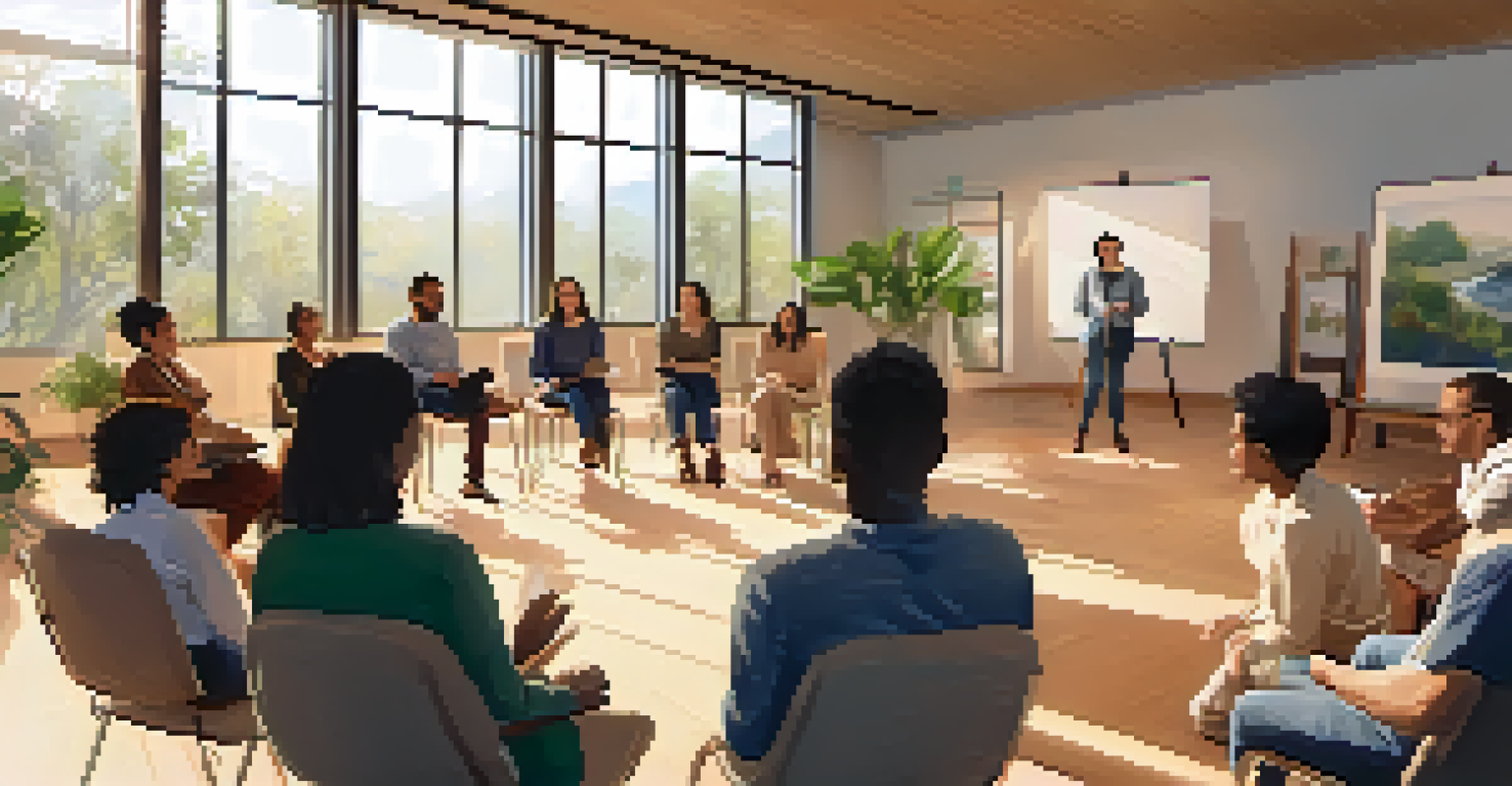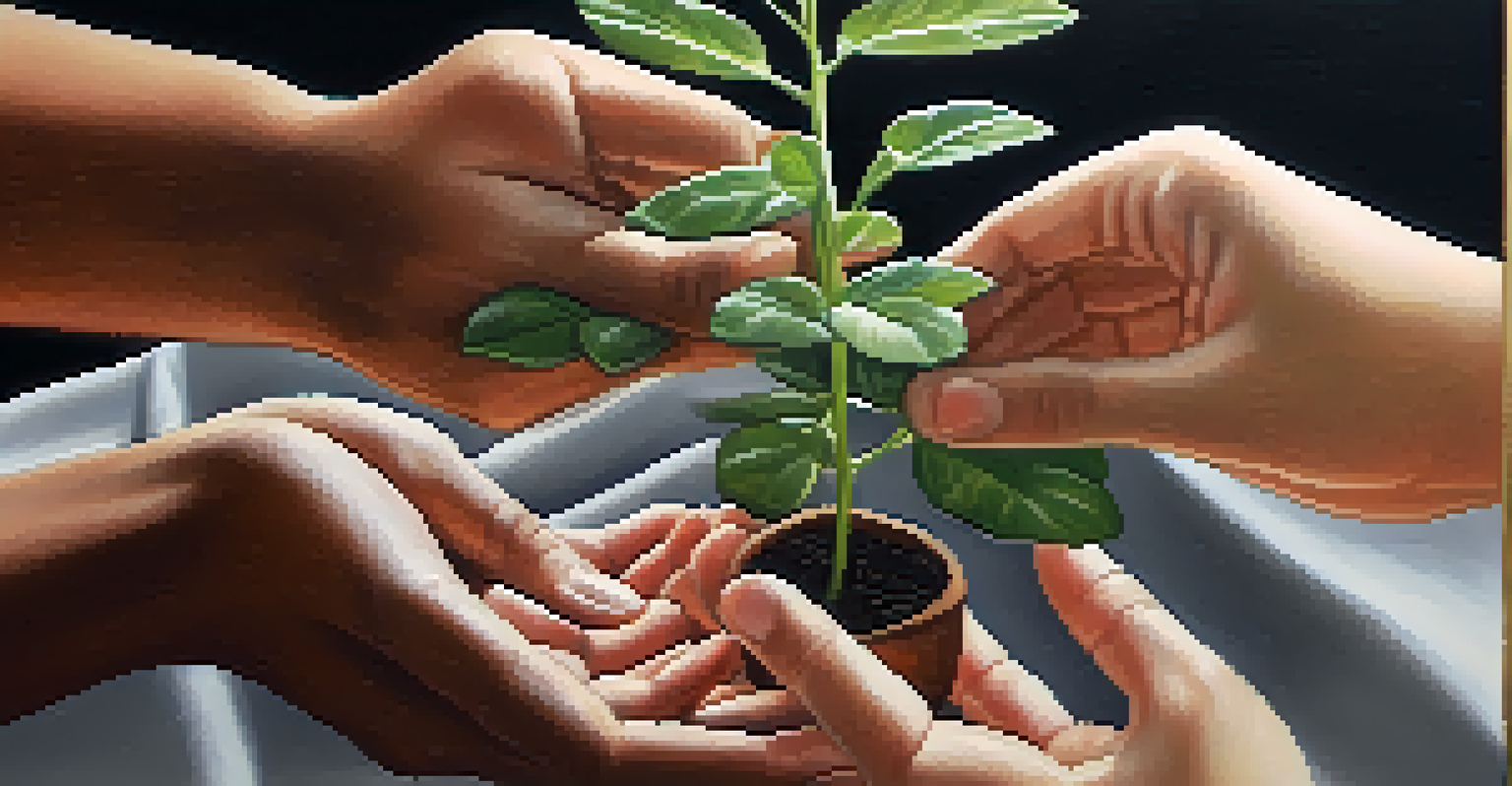The Role of Trust in Community-Based Entheogen Healing

Defining Entheogens and Their Healing Potential
Entheogens, often derived from plants and fungi, have been used for centuries in various cultures for healing and spiritual growth. These substances create altered states of consciousness, allowing individuals to explore their inner selves and connect with the world around them. Understanding their role in healing requires not just knowledge of the substances themselves, but also the context in which they are used.
The journey of a thousand miles begins with one step.
In community settings, entheogens can facilitate profound experiences that promote emotional and psychological healing. Participants often report feelings of connection, insight, and clarity, which can lead to transformative life changes. However, the setting and the relationships formed within the community play a crucial role in shaping these experiences.
Trust becomes a foundational element in this healing journey. When individuals feel safe and supported by their community, they are more likely to fully engage with the entheogenic experience, exploring the depths of their consciousness without fear or hesitation.
The Importance of Trust in Healing Communities
Trust is essential in any community, but it takes on a unique significance in spaces focused on entheogen healing. Participants must feel secure not only in the substances they are consuming but also in the people guiding them through the process. This sense of safety fosters open communication, vulnerability, and a willingness to share personal experiences.

When trust is established, individuals are more likely to disclose their fears, hopes, and intentions, which can deepen their healing. It creates a group dynamic where shared experiences amplify the benefits of the entheogen. In contrast, a lack of trust can lead to anxiety and resistance, hindering the healing process.
Trust Fuels Healing in Communities
Establishing trust within entheogen healing communities is essential for participants to feel safe and supported, enhancing their healing experiences.
Creating an atmosphere of trust involves transparency, empathy, and respect among community members. This collective trust allows for a nurturing environment where healing can truly flourish.
Building Trust Through Shared Experiences
Shared experiences are a powerful way to cultivate trust within a community. When individuals come together to explore entheogens, they often find common ground in their journeys, creating bonds that strengthen their connections. These shared moments can range from group ceremonies to casual discussions about personal insights.
Trust is the glue of life. It's the most essential ingredient in effective communication. It's the foundational principle that holds all relationships.
As participants navigate their entheogenic experiences side by side, they witness each other's vulnerabilities and triumphs. This mutual understanding fosters trust, as individuals realize they are not alone in their challenges. The collective journey allows for a deeper appreciation of the healing potential of entheogens.
Moreover, these shared experiences often lead to the formation of support networks that extend beyond the initial encounter. Trust built in these moments can have lasting impacts, creating a sense of belonging and community that enhances the overall healing journey.
The Role of Experienced Facilitators
Experienced facilitators play a critical role in establishing and maintaining trust within community-based entheogen healing. Their knowledge, skills, and commitment to creating a safe space can significantly influence the participants' experiences. These facilitators often act as guides, helping individuals navigate the complexities of their emotional and spiritual journeys.
A good facilitator establishes clear guidelines, communicates openly, and demonstrates empathy and understanding. This transparency helps to build trust not just in the facilitator, but also in the process as a whole. Participants are more likely to feel secure knowing that they are being led by someone who is knowledgeable and compassionate.
Shared Experiences Build Connections
Engaging in shared experiences allows individuals to bond and cultivate trust, which strengthens their collective healing journey.
Ultimately, the presence of a skilled facilitator can enhance the communal experience, allowing participants to explore their depths with confidence. This trust in leadership is a crucial component of the healing journey.
Navigating Challenges and Building Resilience
Trust is particularly important when challenges arise during the entheogenic experience. Participants may encounter difficult emotions or unresolved traumas, which can be intimidating to face. In these moments, the support of a trusting community can make all the difference, providing reassurance and encouragement.
Communities that foster trust empower individuals to confront their struggles with resilience. When they know they have a supportive network behind them, participants are more likely to embrace their challenges rather than shy away from them. This collective strength can lead to profound breakthroughs and healing.
Additionally, learning how to navigate challenges within a supportive environment builds long-lasting resilience. Participants leave the experience not only with newfound insights but also with practical tools for handling future difficulties, further reinforcing the importance of trust.
Trust as a Catalyst for Change
In community-based entheogen healing, trust acts as a catalyst for personal and collective transformation. When individuals trust their facilitators and fellow participants, they open themselves up to deeper levels of healing and insight. This openness often leads to significant shifts in perspective and behavior.
As participants undergo transformative experiences, they may inspire others within the community to pursue their own healing journeys. The ripple effect of trust and transformation can create a dynamic environment where individuals are encouraged to grow and evolve together. This shared commitment to change fosters a vibrant and supportive community.
Role of Facilitators is Crucial
Experienced facilitators create a secure environment by fostering trust, guiding participants through their emotional and spiritual challenges.
Moreover, the cultivation of trust can extend beyond the healing circle, influencing participants' relationships and interactions in their daily lives. As trust deepens, so does the potential for positive change, both individually and collectively.
The Future of Trust in Entheogen Healing Communities
As interest in entheogen healing grows, the role of trust within these communities is becoming increasingly recognized. Future practices must prioritize the establishment of trust to ensure safe and effective healing experiences. This means not only focusing on the substances themselves but also on the relationships and community dynamics that surround them.
Innovative approaches to community-building and facilitator training could further enhance the role of trust in entheogen healing. By emphasizing communication, empathy, and shared experiences, future communities can create environments where trust flourishes, leading to more profound healing outcomes.

Ultimately, as we move forward, the cultivation of trust will remain a cornerstone of successful community-based entheogen healing. It is through this trust that individuals can embark on transformative journeys, supported by the strength of their community.